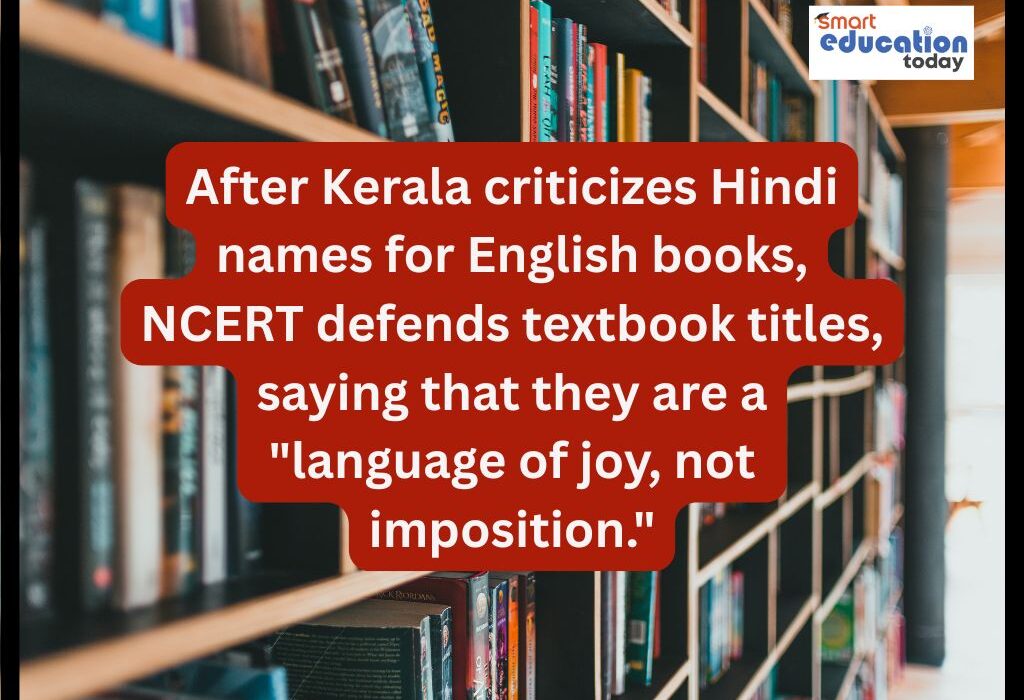The National Education Policy places a strong focus on cultural rootedness, and names like Santoor and Poorvi represent India’s common past, NCERT informed The Indian Express.
Speaking in response to Kerala Education Minister V Sivankutty’s criticism of Hindi titles being applied to English textbooks, the NCERT stated that language textbooks have been named after musical instruments and classical ragas because these aspects of “India’s rich musical heritage are common across all linguistic and cultural traditions of the country.”
NCERT’s decision to assign Hindi titles to English-medium textbooks is “against federal principles and Constitutional values,” Sivankutty said on Monday, adding that it is “absolutely wrong” to change the English titles that have been used for decades “to respect linguistic diversity.”
Kerala is dedicated to preserving linguistic diversity and prioritizing regional cultural freedom, just as other states that do not speak Hindi. Children’s perceptions and imaginations are shaped by the textbook titles, which are more than just names. Students learning English should be given English titles. The leader of the CPI(M) stated that education should be a tool for empowerment and consensus rather than for imposition.
In answer to a question, NCERT stated that its language textbooks are named after famous ragas and Indian musical instruments, such as Bansuri, Malhar, Sarangi, Mridang, Veena, Santoor, Poorvi, Khyal, and Deepakam.
These components of India’s rich musical legacy are universal in all of the nation’s linguistic and cultural traditions, which makes them perfect representations of a single language of happiness. This strategy is in line with the National Education Policy (NEP), 2020, which places a strong focus on cultural rootedness, pleasant learning, and the incorporation of music and the arts into the classroom. Indeed, the NEP acknowledges that music and art provide a universal language of expression that is a language of joy, bridging linguistic divides, the statement read.
NCERT is creating new textbooks that are in line with the National Curriculum Framework for School Education (NCFSE) 2023 and the NEP. In 2023, these were made available for grades 1 and 2, and in 2024, for classes 3 and 6. For classes four, five, seven, and eight, new textbooks are being published this year.
Poorvi is the name of the English textbook for class 6 that was introduced last year and the new one for class 7 that is currently available in stores. The older class 6 English textbook was called Honeysuckle, and the previous class 7 textbook was called Honeycomb.
Santoor is the new English textbook for class 4, whereas Marigold was the previous one.
“NCERT has a long history of naming language and other textbooks, and it is meaningful to use terms derived from Indian classical music,” the NCERT responded. These words have strong cultural and linguistic connotations that help kids better identify with their Indian ancestry; they are neither interchangeable nor translatable. Students start their language journey with familiarity, pride, and a sense of belonging thanks to this practice.
The English textbooks for classes 1 and 2 are named Mridang, “derived from Mridangam, a widely recognized percussion instrument associated with Carnatic music,” while Poorvi is named after a raga and Santoor after a “Kashmiri folk instrument.” The books are “replete with cultural references from across India,” it added.
Similarly, the NCERT stated that the mathematics textbook Ganit Prakash “reflects the contributions of legendary Indian mathematicians such as Aryabhata, Bhaskaracharya, Brahmagupta, and Srinivasa Ramanujan” and “draws from India’s rich mathematical heritage.” There were no titles on the ancient math textbooks.
The adoption of these name standards is based on a profound understanding of their linguistic, cultural, and educational significance rather than linguistic preference. They promote a happy and culturally relevant learning environment for all pupils and are
a reflection of India’s diversity and togetherness. Additionally, NCERT has made sure that these publications are translated into all 22 scheduled Indian languages in accordance with the NEP 2020 mandate, allowing for fair access for students nationwide, according to the NCERT response.
